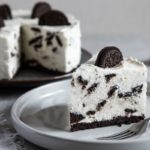Cheesecake might seem like a daunting recipe to attempt if you’re new to baking, but it’s actually quite simple to make! The most difficult part of making cheesecake is ensuring that the base doesn’t crack when you remove it from the tray.
If your cheesecakes keep cracking, you may be feeling frustrated, but don’t worry! While a cracked cheesecake is a baker’s worst nightmare, here are a few different reasons why a cheesecake might crack, and just as many ways to fix the problem in the future.
This is an article for those bakers who are wondering, ‘why did my cheesecake crack?’
Hopefully, by the end of the article, you’ll understand why your cheesecake didn’t hold its form and what you can do to fix it in the moment and stop this from happening next time.
Reasons Cheesecakes Crack
1. Excessive Mixing
It’s easy to end up with a cracked cheesecake if you overmix the cheesecake batter. When you mix the batter excessively, you allow too much air to enter the mixture.
This results in a puffy consistency and makes the cheesecake much more likely to crack.
You should only be mixing the cheesecake batter until it is a light and fluffy, smooth batter. If you proceed beyond this point, you run the risk of your cheesecake cracking.
2. Sticking To The Pan
It’s very difficult to take a cheesecake out of the pan without it cracking if you allow it to get stuck to the pan.
When your cheesecake sticks to the springform pan, the edges often get left behind when you try to lift the finished product. This can not only cause cracks but a complete collapse of your cheesecake.
3. Overbaking
Like most baked goods, cheesecake can suffer if you bake it for longer than the recommended time.
Often, bakers will make the mistake of continuing to cook a cheesecake because it doesn’t feel fully cooked in the center.
However, the center of your cheesecake will actually bake itself for a while longer once you remove it from the oven, so you should always follow the cooking time stated in your recipe.
4. Temperature Fluctuations
Fluctuating temperatures can be detrimental to the stability of your cheesecake. If you take a cheesecake straight out of the oven and immediately put it in the refrigerator, for example, it’s likely to crack and fall apart.
5. Skipping The Water Bath
Most cheesecake recipes call for a water bath, and for good reason. The water bath contributes moisture to the cheesecake mixture, preventing it from drying out and cracking.
Additionally, the water bath slows down the cooking process, resulting in a more gradual temperature change.
As we just mentioned, drastic changes in temperature can cause cheesecake cracks, so you should never skip the water bath stage of the recipe.
How To Fix A Cracked Cheesecake
So, your cheesecake has cracked. What now? First of all, don’t throw the cheesecake away! Most of the time, minor cracks can be fixed quite easily, and you can even turn a majorly cracked cheesecake into a delicious dessert.
If you only have one or two small cracks in your cheesecake, you should let it cool down completely and then use a hot spatula blade to press the cracks back together.
For medium cracks, you could try adding an extra topping to conceal the cracking cheesecake. Whipped cream works great for this, or even chocolate ganache. Basically, anything that works with the flavor of your cheesecake can be used as a disguise.
Larger cracks in a cheesecake can be more problematic, but don’t give up! Start by trying to gently push the cheesecake back together by pressing softly on the sides.
If this doesn’t work, try to use the cracks as starting points for cutting the cheesecake. Hopefully, the cracks will be less noticeable when the cheesecake is cut into slices.
Stopping A Cheesecake From Cracking
You can usually fix a cracked cheesecake, at least partially, using the methods outlined above. However, ideally, you don’t want any cracks in your cheesecake at all. Here’s how you can stop this from happening again next time:
1. Mix By Hand
As we have already stated, overmixing is one of the main reasons why cheesecakes crack.
Electric mixers might be convenient and time-saving, but they can also easily lead to overmixing, so next time, try mixing your cheesecake by hand instead.
2. Use Ingredients At Room Temperature
Cream cheese is the main ingredient in a cheesecake, and it’s also responsible for a lot of cracked cheesecakes.
The most common reason why cream cheese causes cheesecakes to crack is if it’s too cold (again, remember that drastic temperature changes cause cracks).
Allow your cream cheese to reach room temperature before incorporating it into your mixture.
3. Don’t Skip The Water Bath
Never make a cheesecake without a water bath! As we explained earlier, the water bath helps to keep the cheesecake moist and stops it from getting too hot too quickly during the baking process, which minimizes the risk of cracks.
4. Never Overbake
Trust the cheesecake recipe you’re following and don’t add any extra minutes to the cooking time. It’s normal for the center of your cheesecake to seem slightly underbaked when you take it out of the oven – it will continue cooking for a few minutes out of the oven.
5. Don’t Rush The Cooling Process
Trying to speed up the cooling process by transferring your cheesecake straight from the oven to the refrigerator is never a good idea. Always make sure that your cheesecake cools fully at room temperature before refrigerating.
6. Don’t Let It Stick
Once you remove your cheesecake from the oven, take a spatula or knife and gently run the utensil around the edges of the cheesecake inside the pan. This will stop it from sticking to the pan as it cools down.
Final Thoughts
The question ‘why did my cheesecake crack’ is one of the most-asked questions related to baking cheesecake.
However, if you’re confused as to why your cheesecake cracked, there are simple fixes and preventative measures to stop this from being a problem.
Make sure to only use cream cheese at room temperature, mix carefully, use a water bath, don’t overbake, and make sure the cheesecake doesn’t stick to the pan.
Avoid refrigerating a hot cheesecake as this can cause cracks.
If your cheesecake does crack, you can try different fixes depending on the size of the cracks. Smoothing over the top, adding more topping, pressing the sides, or even cutting around the cracks can help to disguise a cracking cheesecake.










